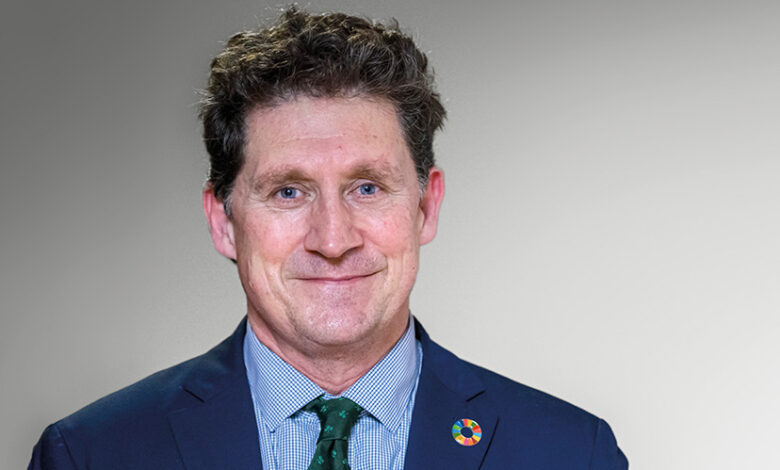
Minister Eamon Ryan TD says it is critical to ensure an integrated approach to the challenges of the climate, biodiversity, and pollution crises.
Ryan states that Budget 2023 shows that “all three government parties are committed to working in a way which ensures that these three sectors deliver an integrated response”.
“This year the retrofit budget has went from about €300 million to €500 million in 2023. Wider industry knows that retrofitting is inevitable and they are able to gear up to face the biggest obstacle coming, which is getting workers, as they can have confidence in our budgets. In previous years, funding was stop-start”.
On agriculture, the Minister outlines spending increases announced in the Budget: “There is €500 million within the agricultural budget, committed to agri-environment schemes, addressing biodiversity loss within agriculture. This is a key part of what we need to do. The farming community, in my opinion, is starting to clearly buy into it; it has been transformed because people know that it makes economic sense as well as environmental sense. We are starting to see the change we need in Irish agriculture.”
Land use review
Ryan states that the concept of land use reform has come a long way since the formation of the Government, and promotes the land use review as key to achieving emissions reductions.
“We found it very difficult in the initial negotiations for the Programme for Government to even say ‘land use plan’ for fear that you are just telling a farmer or a forester what to do.
“From my point of view, the [land use] review is critical as it is the central key mechanism to make sure that we are engaged in pollution reduction, restoration of biodiversity, as well as the lowering of emissions. It is half way through its course, the first half being an evidence gathering phase in collaboration with the EPA, Teagasc, and other state agencies.”
He further outlines the necessity for ensuring that the land use review “now moves onto the policy formulation side” and that prioritises rural communities, ensuring that they play their part in “restoring biodiversity, reducing emissions, and addressing the water nitrogen and ammonia pollution problems”.
“We want to manage grazing and wetlands so that we can manage the storing of carbon in the peaty soils where you manage it as a wetland area, thus helping in the storing of that carbon and at the same time getting an agricultural output.”
He adds: “In certain parts of the country you see the ammonia and nitrogen issue flaring because of an intensive agriculture practice primarily.”
Scope for biomethane production
Looking to the sectoral emissions ceilings outlined in the Programme for Government, Minister Ryan outlines his belief in the potential of the agricultural sector in playing a role in production of biogas.
“The agriculture sector in this country is very much geared towards grass growth. However, they could take half of that grass growth and feed it into anaerobic digestion, mixed with waste products, and the slurry from the remaining herd on the other side of the farm. That process, if adopted by our agricultural sector on a wide scale, can give us a source of gas which is potentially sustainable.”
He continues: “You could have a farm producing its own gas, running its own machinery, running a CHP plant off it for its own use, and still have an export capability. With that, you still have a real potential to use the digestate to fertilise the land rather than synthetic, artificial, fossil-based fertilisers. From that you can then start to get a circular, sustainable solution which delivers on climate, helps with biodiversity, and helps with pollution.”
Managing forestry and wetlands
Ryan believes that “Our whole forestry has to change; a clear felling monoculture, short rotation crop system, whilst it may deliver a lot of timber and could even be seen as a storer of carbon, is not good for biodiversity and it does not help with our pollution problems”.
He adds: “The Bill for riparian forestry systems, being worked on by [Minister of State] Pippa Hackett TD, has huge potential benefits; it allows us to expand and increase our store of carbon in forestry, our land use sector is the sector where we do not currently have the necessary carbon storage solutions.”
The Minister states that it is crucial to begin “re-wetting our lands”, and acknowledges that this will mean significant reform for agricultural practices.
“This is going to be very difficult because for 50 years we have been telling farmers to drain their land, optimise it, and get maximum output. Now we are saying ‘block the drains, wet the land’.
“By managing grazing and wetland management, which is good for birdlife and good for biodiversity, you do not just let it go wild in the sense that you see hazel, birch, and other treelines coming up because that would drain the land for carbon. We want to manage grazing and wetlands so that we can manage the storing of carbon in the peaty soils where you manage it as a wetland area, thus helping in the storing of that carbon and at the same time getting an agricultural output.”
The Minister concludes by stating that: “We need to know how to ensure that these complementary but different sectors can work in tandem to stop climate change, restore nature, and reduce pollution.”





